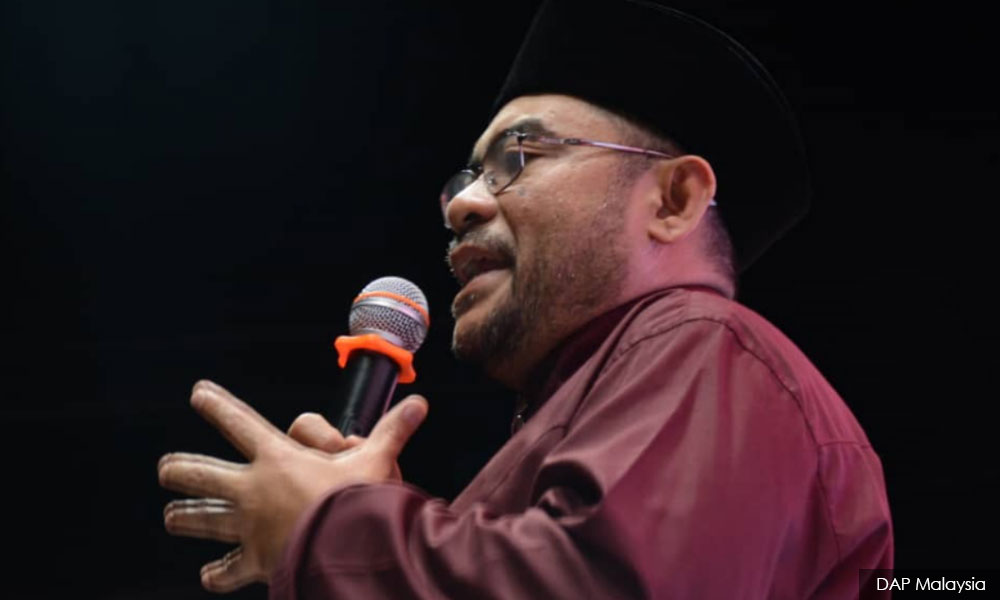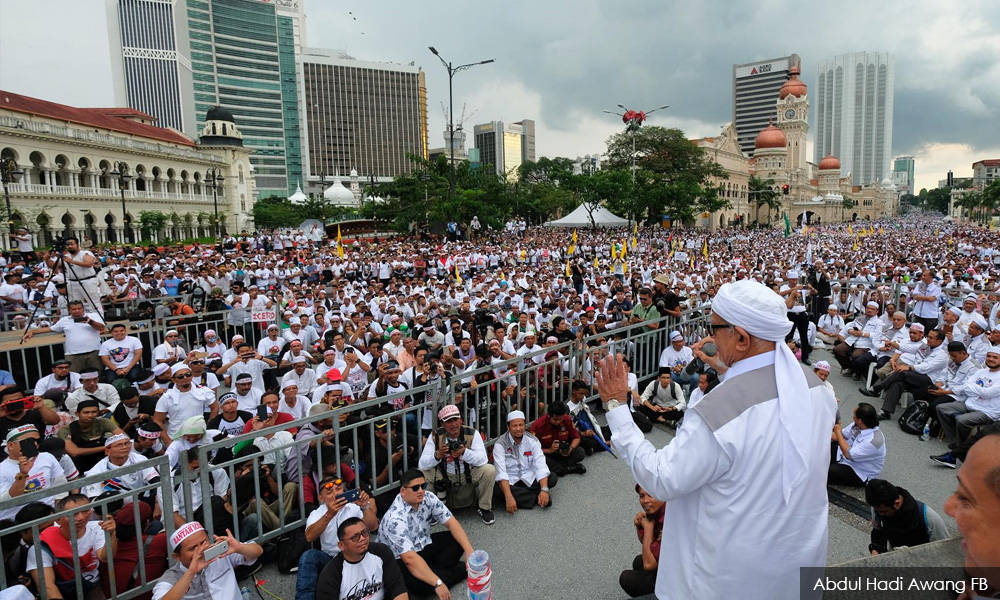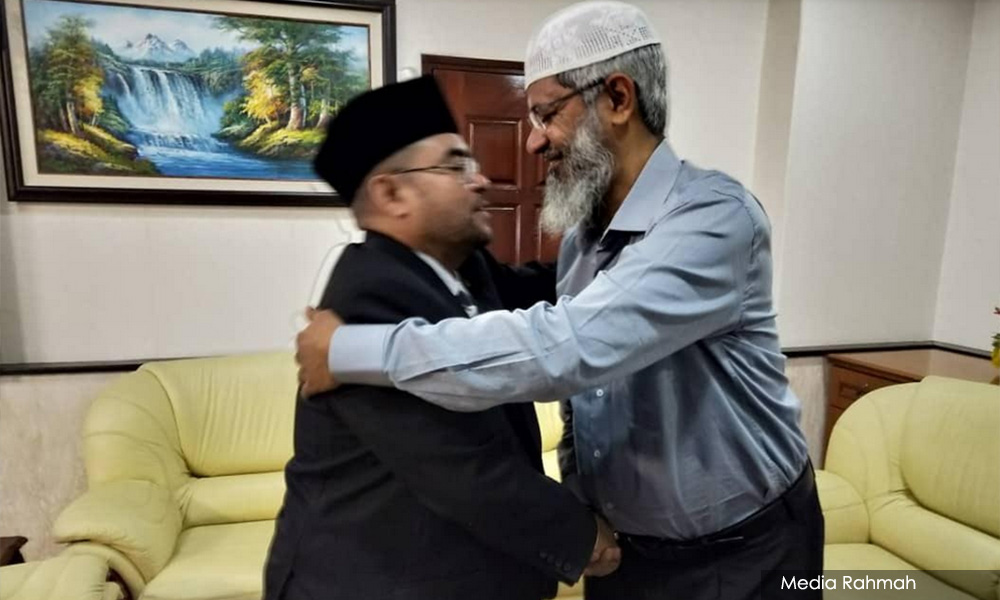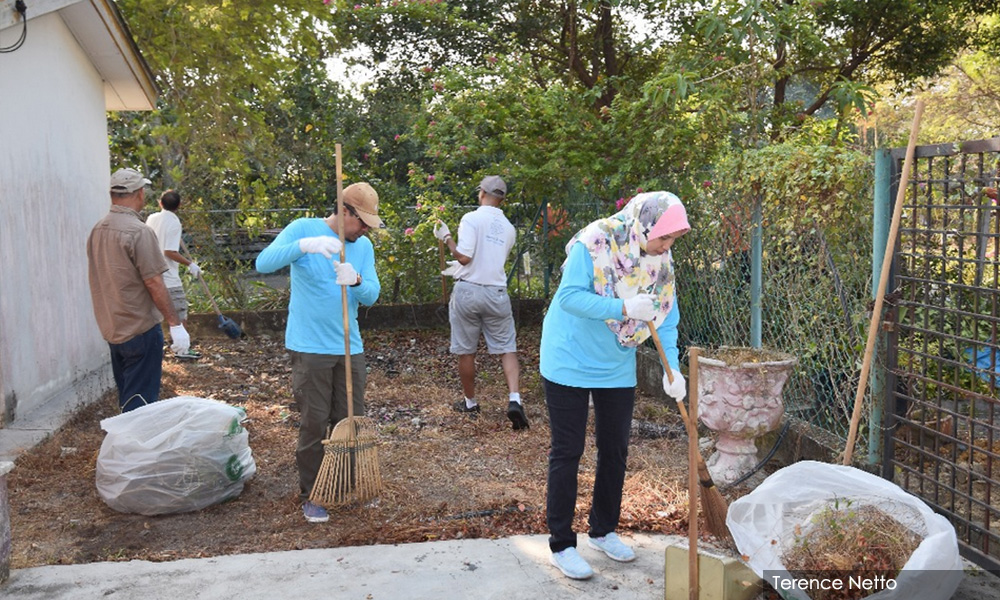
Mujahid Yusof Rawa and Abdul Rahman Kassim are birds of an Islamist feather who once flocked together from a desire to give the best impression of their faith to non-Muslims.
Their ties go back a long way because the older Abdul Rahman, now 63, in his youth was a strong supporter of Mujahid's father, Yusof Rawa, who was considered PAS royalty.
This was on account of Yusof's role as the first Mursyidul Am (spiritual director) of PAS, his long track record of benefaction to the party (his family's printing business prospered and he was generous with the proceeds), and, more signally, his defeat of Dr Mahathir Mohamad in the parliamentary seat of Kota Setar Selatan in the 1969 general elections (GE3), a feat that enjoys a special niche in PAS lore.
Ten years ago, Mujahid, in imitation of Yusof Rawa's inclusivist inclinations, led the PAS overture to church groups in the northern part of the Peninsula in the wake of Muslim restiveness over the use of the term “Allah” by peninsular Christians in faith education and worship.
As head of the Lajnah Perpaduan (national unity bureau) in PAS, Mujahid was allowed some latitude in pursuing this initiative, although the party was opposed, as most right-wing Malay groups were, to Christians' use of the 'Allah' word.
One supposes that when you are the scion of PAS royalty (Yusof Rawa died in 2000), you are allowed some freedom to explore the margins to see and report what lies beyond.
A graduate in Arabic literature (note: not Islamic studies) from al-Azhar, Sunni Islam's renowned seat of learning, Mujahid was inclined towards exploration, if not by literary promptings, then by hereditary inclinations.
Yusof Rawa, in the mid-1980s, as president of PAS, had pioneered the outreach to the Chinese community. He set up the PAS Chinese Consultative Committee to convey the message that Islam's universalist ideals precluded ethnocentricism.
Contacts with church groups
In a similar spirit in 2009, Mujahid, with Abdul Rahman in tow, initiated contacts with church groups in Penang, northern Perak and Kedah with whom he engaged in interfaith dialogue aimed at assuaging the fears of minority religions in Malaysia over an Islam viewed by some quarters as menacingly thrusting.
Soon the Mujahid-Abdul Rahman partnership was seen, in the northern part of the peninsula at least, as the benign face of Islam, as a result of dialogues sessions and get-togethers over dinner.
Never mind that this interaction with Christian groups was little more than feel good (syiok sendiri) sessions, focused on forging personal contacts, rather than coming to grips with the differences that separated them. In the mood of the times, appearances mattered more than reality, form more than substance.
For Mujahid, this programme of outreach, which included responsibility for the restructuring of the PAS Supporters Club, the party's fledgling non-Muslim wing, into a unit that was more than just a non-voting adjunct of the party, projected him as a supra-partisan, supra-racial and supra-religious politician, in the eyes of non-Muslims.
In Parit Buntar, the Malay-majority parliamentary seat in northern Perak which he won on a PAS ticket in the 2008 general election (GE12), endeared him to the Chinese community of mostly fishermen and small traders.
He improved on his 2008 winning majority in the 2013 general election (GE13), due largely to the solidity of his support among Parit Buntar's Chinese voters.
Following GE13, PAS was embroiled in internal conflict, its principal cause being the gulf that had opened up within it from president Hadi Awang's desire to get rid of the outreach-seeking professionals who had joined the Islamist party in droves from 1998 onwards, on the heels of Anwar Ibrahim's sacking from Umno and government.
Routed in the divisive party polls in June 2015, the professionals, Mujahid included, left to form Parti Amanah Negara (Amanah) in September that year. Mujahid became a vice president of Amanah.
Abdul Rahman declined to join Amanah; he was a PAS loyalist through and through. A retired air traffic controller at the RMAF base in Butterworth, he parted company with Mujahid, but continued, even expanded, on the outreach programmes to Christians.
This was a seeming contradiction because PAS, under Hadi, was moving towards fundamentalism, whereas Amanah, prompted by Mujahid, was seeking outreach.

That contradiction would come to haunt Abdul Rahman. Last December, he invited flak from his Christian friends when they learned he had taken part in the PAS/Umno organised demo against the International Convention on the Elimination of All Forms of Racial Discrimination (Icerd).
His Christian interlocutors queried him on how he could justify his presence at the rally when interfaith dialogue presupposes the equality of all those who engage in it. Opposition to ICERD does not gell with promotion of interfaith dialogue.
Rahman squirmed under the remonstrance of his Christian friends, but he was not the only one having to contend with the gap between his efforts at outreach and his party's political stance.
Mujahid, too, was in a spot of bother last month over his criticism of LGBT participation in the International Women's Day march in Kuala Lumpur. The criticism drew fire from women's rights groups.

Stung by the criticism, Mujahid, Minister of Islamic Affairs in the ruling Pakatan Harapan coalition, compounded matters by meeting controversial Islamic preacher Zakir Naik, whose style of preaching the minister had only last September assailed as “unsuitable”.
Afterwards, in a Facebook post, Mujahid hailed Zakir Naik as an “inspirational” preacher.
That description invited more brickbats from critics, prompting further contortions by Mujahid as he tried to bail out with damage-control that undermined his decade-old public image as a credible exponent of Muslim outreach.
Obviously, promoters of Muslim outreach, like Abdul Rahman and Mujahid, were having a hard time reconciling divergent personal and political promptings. Both tried to salvage their tattered credentials by organising events aimed at emphasising their ecumenism.
Coincidentally, March 23 was the day when this effort at outreach saw Mujahid lead the March for Peace in Kuala Lumpur, at which a crowd of about 300 people turned up to demonstrate their rejection of the Islamophobia that supposedly led to the mass shooting of Muslims in Christchurch in New Zealand.

Abdul Rahman assembled a crowd of about 200 multiracial-and-religious volunteers in a housing estate in Bukit Mertajam for a gotong-royong clean-up project at a hotspot for dengue fever in Penang. With help from the Seberang Perai Municipal Council, the PAS Unit Amal and church groups combined with people from the residents association of the Taman Permata housing estate to clear rubbish, sweep drains, trim low-hanging and protuberant tree branches, and uproot brush which they threw into council lorries that carted away the detritus.
Children and adults threw themselves into a two-and-a-hour operation that saw the races mix, laugh and help each other in the clean-up. The upshot: a run-down locality looked spruce after an effort that brought people of diverse confessions together to see what good they could do in a cooperative venture.
Afterwards, Abdul Rahman appeared satisfied that matching good deeds to noble intentions was a much easier and supportable task than handling queries over political stances (opposition to Icerd) that diverged from socially emollient practices (interfaith dialogue). He was content to let action speak louder than stance.
As to his relationship with Mujahid, he said, “We are still friends but we don't work together like before.”
TERENCE NETTO has been a journalist for more than four decades. - Mkini



No comments:
Post a Comment
Note: Only a member of this blog may post a comment.